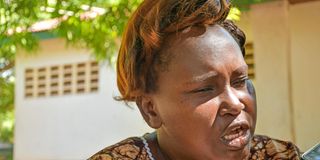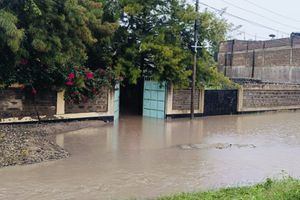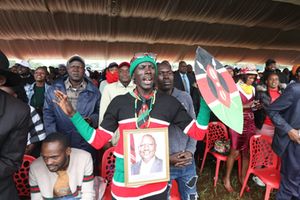Happening Now: Labour Day celebrations at Uhuru Gardens
Blind mother of nine giving her all for persons with disabilities

Ms Salome Karisa speaking to nation.africa during the interview.
What you need to know:
- Salome Karisa has dedicated her time and resources to fight for the rights of persons living with disabilities , earning her the name Askari wa walemavu.
- The partially blind woman has brought together six groups under the Elimu Kwanza Community-based Organisation to ensure children living with disabilities get education.
Her energy can only be compared to that of a teen girl chasing her goals in life. She is a common figure on the streets of Kilifi, the national and county governments’ corridors, the police stations and the courts. One would actually mistake her for a public servant.
Salome Karisa, 43, from Kiwapa in Kibarani Location has dedicated her time and resources to fight for the rights of persons living with disabilities (PLWD). Her advocacy has earned her the name Askari wa walemavu.
When she started, it was hard to explain to her children why she spent more time with PWDs.
“Initially, my children could not understand why I shared the little food we had with a poor mother with a disabled child. They could question why I would say I don’t have money to take boda boda but instead trek in the hot sun to follow-up on a case that involved a PWD,” says the mother of nine.
She always carries a bag containing a notebook, pen and an envelope holding documents on issues affecting PWDs. The issues include sexual gender-based violence, domestic violence, negligence, child labour, education and food support, among other problems.
When nation.africa catches up with her along the Kilifi-Bofa Road, she is headed to a non-government organisation in Kilifi to collect sanitary towels for some girls she supports.
“I have a group of girls with disabilities whose parents cannot afford sanitary towels. Majority are being raised by single mothers hustling to buy food,” she says.
In 2019, Ms Karisa who is partially blind, mobilised PWDs from Kilifi to sensitise them on how to elect good leaders. Despite PWDs participating in elections, majority still suffer. This is the genesis of her campaign and formation of groups that will see them empowered.
PWDs goodies
“During campaigns, politicians promise PWDs goodies, in vain,” she adds.
Ms Karisa says she has registered the groups to enable PLWDs access development funds from the national and county governments, and other financial institutions.
She brought together six groups under the Elimu Kwanza Community-based Organisation to ensure children living with disabilities get education.
“It was not easy bringing together parents of children with disabilities most of whom are women. They are stigmatised after their husbands and families abandon them. They are embarrassed to openly talk about their children,” says Ms Karisa.
She adds that life for these mothers is tougher during the pandemic. They can neither afford to feed their children nor take them to school, exposing them to sexual and physical abuse.
“These mothers have other children to take care of, making it difficult to balance their time for the sake of the child with disability,” she adds.
Elimu Kwanza submitted a proposal to the Kilifi County government to initiate a feeding program in special schools to support these mothers. She also plans to enrol more children to special units so that they are registered with the National Council for Person with Disability (NCPWDs) that will see them get special identification card (IDs).
“Well-wishers who want to support the children ask for special IDs from NCPWDs, but most aren’t registered,” Ms Karisa adds.
Sign language
Her lowest moment, she says, is when she has to fight for a PWD who has been abused, noting that even with clear laws, most of them are still subjected to harsh working conditions.
Ms Karisa also laments that despite their plea, police officers are not trained on sign language, making it difficult for the deaf and dumb to communicate at police stations.
“I am not conversant with sign language but I use the little knowledge I have to explain to the officers. I introduced a pen and book system where the police and the deaf communicate through writing on paper,” she says.
Victims of gender-based violence, in most cases, are unwilling to report the cases for fear of being frustrated in the justice process. She reveals that mothers also fear speaking out when their children are abused due to stigma.
Ms Karisa holds back tears as she narrates how some members of the public accuse her of purporting to fight for the PWDs for her benefit. They have nicknamed her omba omba (consistently borrowing).
She has so far, helped 42 PWDs get registered to acquire IDs. She is also supporting the groups to start a poultry project for large-scale egg production.
Elimu Kwanza has drafted a Sh5 million proposal for the project and targets to benefit 130 PWDs groups in Kilifi.
"The only way to uplift PWDs is to economically support them and ensure their businesses are stable," says Ms Karisa.





